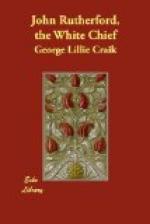“A few days,” says he, “after our return home from Showrackee, we were alarmed by observing smoke ascending in large quantities from several of the mountains, and by the natives running about the village in all directions, and singing out Kipoke,[CO] which signifies a ship on the coast. I was quite overjoyed to hear the news.
“Aimy and I, accompanied by several of the warriors, and followed by a number of slaves, loaded with mats and potatoes, and driving pigs before them for the purpose of trading with the ship, immediately set off for Tokamardo; and in two days we arrived at that place, the unfortunate scene of the capture of our ship and its crew on the 7th of March, 1816. I now perceived the ship under sail, at about twenty miles distance from the land, off which the wind was blowing strong, which prevented her nearing. Meanwhile, as it was drawing towards night, we encamped, and sat down to supper.
“I observed that several of the natives still wore round their necks and wrists many of the trinkets which they had taken out of our ship. As Aimy and I sat together at supper, a slave arrived with a new basket, which he placed before me, saying that it was a present from his master. I asked him what was in the basket, and he informed me that it was part of a slave girl’s thigh, that had been killed three days before. It was cooked, he added, and was very nice. I then commanded him to open it, which he did, when it presented the appearance of a piece of pork which had been baked in the oven. I made a present of it to Aimy, who divided it among the chiefs.
“The chiefs now consulted together, and resolved that, if the ship came in, they would take her, and murder the crew. Next morning she was observed to be much nearer than she had been the night before; but the chiefs were still afraid she would not come in, and therefore agreed that I should be sent on board, on purpose to decoy her to the land, which I promised to do.
“I was then dressed in a feathered cloak, belt, and turban, and armed with a battle axe, the head of which was formed of a stone which, resembled green glass, but was so hard as to turn the heaviest blow of the hardest steel. The handle was of hard black wood, handsomely carved and adorned with feathers. In this attire I went off in a canoe, accompanied by a son of one of the chiefs, and four slaves. When we came alongside of the vessel, which turned out to be an American brig, commanded by Captain Jackson, employed in trading among the islands in the South Sea, and then bound for the coast of California, I immediately went on board, and presented myself to the captain, who, as soon as he saw me, exclaimed, ‘Here is a white New Zealander.’
“I told him that I was not a New Zealander, but an Englishman; upon which he invited me into his cabin, where I gave him an account of my errand and of all my misfortunes.
“I informed him of the danger his ship would be exposed to if he put in at that part of the island; and therefore begged of him to stand off as quickly as possible, and take me along with him, as this was the only chance I had ever had of escaping.




